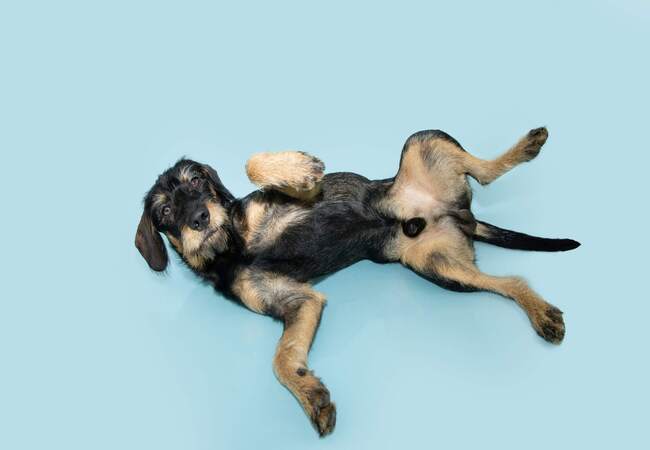Vet’s 2025 Guide to Canine Sperm Duct (Epididymal) Cysts🩺

In this article
Vet’s 2025 Guide to Canine Sperm Duct (Epididymal) Cysts🩺
By Dr. Duncan Houston BVSc
💡 What Are Sperm Duct Cysts?
Sperm duct cysts in dogs—including spermatoceles and sperm granulomas—form when sperm escape from the epididymis into surrounding tissues, creating fluid-filled or inflammatory nodules. Spermatoceles are simple cysts, while sperm granulomas develop when sperm leakage stimulates chronic inflammation.
🚩 Who Is Affected & Why?
- 🐶 Intact male dogs of any age or breed, though more common in older dogs.
- 🔧 Causes include trauma to the epididymis or vas deferens, congenital duct defects, reproductive surgery complications (e.g., vasectomy), adenomyosis, or epithelial overgrowth.
- 🎯 Cysts may occur unilaterally—often asymptomatic—or bilaterally, affecting fertility significantly.
👀 Clinical Signs & Impact
- 🧍♂️ Palpable scrotal lumps—soft or firm; may fluctuate in size depending on content.
- 😖 Usually painless unless inflammatory, infected, or ruptured.
- 🛑 Infertility—especially in bilateral cases—due to duct obstruction and azoospermia.
- 🟤 Semen abnormalities—reduced volume, abnormal color/pus if inflammation present.
🧪 Diagnosis & Work-Up
- History & physical exam: assess lumps, reproductive history, trauma or surgery; palpate scrotum for consistency.
- Semen analysis: check volume and sperm count—bilateral involvement usually shows azoospermia.
- Ultrasound: key diagnostic tool—high resolution imaging reveals cystic structures vs testicular tumors.
- Culture & cytology: if fluid aspirated—assess for infection/inflammation.
- Advanced diagnostics: testicular biopsy or excision may evaluate spermatogenesis or rule out tumors.
🛠 Treatment & Management Options
1. Medical Management
- 🩹 Anti-inflammatories (NSAIDs) to reduce discomfort and swelling.
- 💊 Antibiotics if infection is suspected (culture-guided).
- 🛌 Watchful waiting with regular monitoring for small, asymptomatic cysts.
2. Surgical Intervention
- ✂️ Cyst removal with preservation of testicular tissue and duct integrity if unilateral.
- 🔁 Repeat cysts or severe inflammation may require epididymectomy or vasectomy.
- ✂️ Castration—most effective treatment for affected stud dogs to eliminate cyst and reduce risk of recurrence.
📈 Prognosis & Reproductive Outcome
- ✅ Unilateral cases managed early often maintain fertility.
- ⚠️ Bilateral obstructive cysts—infertility likely; sperm storage and assisted reproduction may be an option if preserved.
- 💔 Surgical success depends on preserved testicular and epididymal function.
- 🏥 Regular follow-up with semen checks and ultrasound recommended every 1–3 months post-treatment.
🏠 Ask A Vet App Home Monitoring Tools 📲🐶
- 📷 Upload images of scrotal bumps—track changes in size or pain.
- 📊 Log semen quality results to monitor recovery after treatment.
- 📆 Appointment reminders for semen tests and follow-ups.
- 🔔 Alerts for sudden swelling, pain, or ruptures—prompt veterinary intervention.
- 📚 In‑app guides on cyst monitoring, semen collection, grooming after surgery.
🔑 Key Takeaways 🧠✅
- Sperm duct cysts—spermatoceles/granulomas—present as scrotal lumps, often asymptomatic unless bilateral.
- Ultrasound and semen analysis are critical for accurate diagnosis.
- Treatment varies: from monitoring and anti-inflammatories to surgery or castration.
- Unilateral cases recover fertility; bilateral often result in permanent infertility.
- Ask A Vet supports owners with tracking, alerts & digital veterinary collaboration.
🩺 Final Thoughts ❤️
In 2025, understanding, diagnosing, and managing sperm duct cysts in dogs empowers compassionate care. With timely diagnostics—including ultrasound and semen evaluation—stud dogs can be treated effectively, preserving breeding potential when possible. Home support via Ask A Vet ensures vigilant monitoring, follow‑up, and improved outcomes. Whether monitoring benign cysts or planning surgery, partner with your vet and use digital tools to guide your dog toward optimal reproductive health. 🐾✨
Visit AskAVet.com and download the Ask A Vet app to capture cyst photos, log semen results, set reminders, upload diagnostic reports, and collaborate with your veterinarian anytime. 📲🐶






